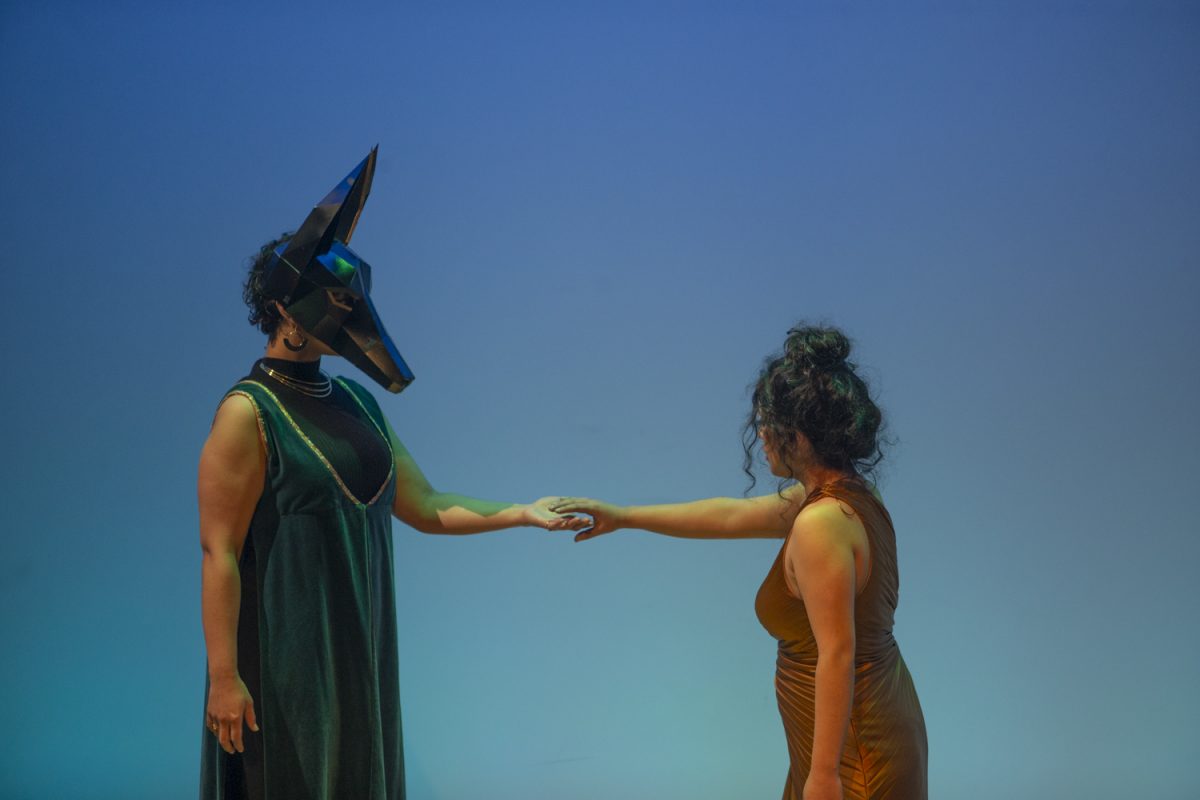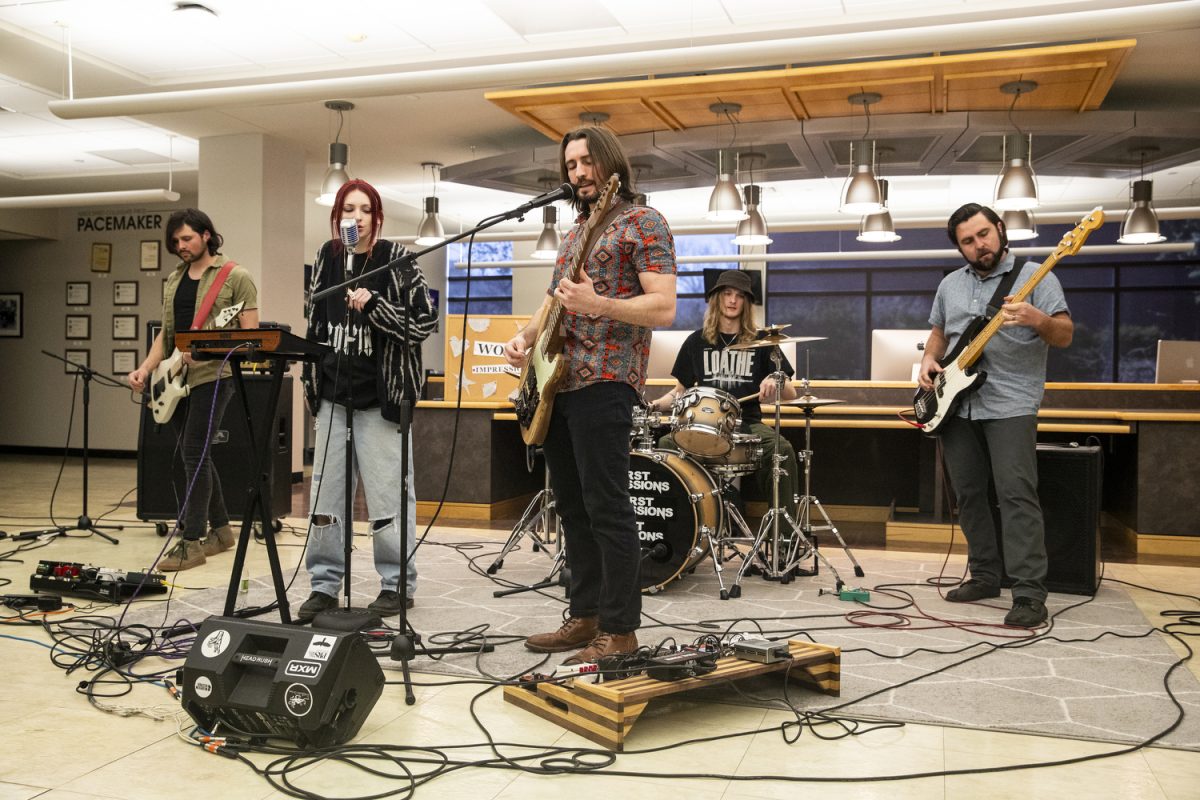Bestselling author Andre Dubus III said he has fond memories of growing up in Iowa City.
“My grandmother had just bought us four kids a little black and white TV, which not everyone had in the 60’s,” Dubus said. “Every night at 8 o’ clock, ‘Batman’ came on and this guy next door would come over and watch it with us. He was a chain smoker and really loved the show. One day [the guy] sat on the couch and said, ‘So man, who’s your favorite character?’ And I said, ‘Um, um, I like False Face.’ And he said, ‘Yeah, I like The Riddler.’ Anyways, that guy was Kurt Vonnegut.”
This was no coincidence as the acclaimed Vonnegut taught Dubus’ father at the UI Writer’s Workshop. Like the elder Dubus, Dubus III has writen numerous short stories. However, the younger Dubus said he is most comfortable with longer literary forms, as evidenced by his 1999 novel House of Sand and Fog (which was both selected for Oprah’s Book Club and became a major motion picture starring Jennifer Connelly).
Tonight, Dubus makes his return to the literary city where he will read from his newest novel, The Garden of Last Days, at the Iowa City Public Library, 123 S. Linn. The event, co-sponsored by Prairie Lights, is free to the public and will kick off at 7 p.m.
“[Dubus has] got good people skills and a lot of those people skills show up in the book,” said Prairie Lights buyer Paul Ingram. “He is a very careful observer of what’s going on right now and he has something to say about it. He has great style and I feel he’s going to be around for awhile.”
Though Dubus wrote two books before House of Sand and Fog, it wasn’t until this third release that he received critical attention.
“I never thought my writing would make any money — I was just happy to get into print,” Dubus said. “So it was such a wonderful surprise when, you know, it made me a fuckin’ millionaire…I wasn’t really used to [the money] so I just tried to get rid of it as fast as I could. I was able to build most of my house with it.”
Dubus may have seen sudden financial success, but he grew up in a relatively poor family with three sisters. From 1964 to 1966, he lived at 502 Brown Street in Iowa City after his father left the marines to pursue a career in writing (the elder Dubus would become one of the most revered authors to graduate from the program).
“My dad loved the Writer’s Workshop,” the younger Dubus said. “He had nothing but good things to say about his time at Iowa and he made friends with other writers there that lasted his entire life.”
Dubus’ brief years in the literary city stuck with him and now he spends most of his days writing and teaching college courses. The research process for The Garden of Last Days, which tells the tale of a stripper who dances for one of the 9/11 terrorists days before the attack, took the author to some unlikely venues for a husband and father of three.
“I went on the computer and started researching for the book only to find out that some of the 9/11 terrorists were seen at a strip club in Florida, so I flew there,” Dubus said. “I went to the clubs these guys were seen in and instead of getting a private dance I would pay a dancer 20 bucks a song and just ask her questions about the job. They were very willing to take my 20 bucks and sit there and have a cigarette and [talk].”
Despite the heightened amount of media attention The Garden of Last Days has received, Dubus says that he doesn’t like to talk about the business aspect of his writing. He also recently stopped reading reviews of his work.
“Really, I just don’t think about that shit,” Dubus said. “What excites me about writing is writing and that’s why I do it. At the end of the day it’s about writing really honest and creating a provocative scene in order to write a really good book.”
Selected excerpts:
“April drove north on Washington Boulevard in the late-afternoon heat. She passed housing developments behind acacia and cedar trees, Spanish moss hanging from their limbs like strings of dead spiders. Between her legs was the black coffee she’d bought at the Mobil station on the way out of town and it was too hot to drink, the sun still shining bright over the Gulf and blinding her from the side like something she should’ve seen coming, like Jean getting laid up and now there’s no one to watch Franny and no calling in sick at the Puma. And little Franny was strapped in her car seat in the back, tired and happy with no idea how different tonight will be, how strange it will be.
But even in September, Thursday was a big money night, seven to eight hundred take-home, and that’s what April concentrated on as she drove, Franny’s chin starting to loll against her chest—April made herself think of that fat roll of tens and twenties she’d have at closing, how she’d fold it into the front pocket of her jeans and then go to the house mom’s office off the dressing room and give Tina a hundred before she found Franny in her pj’s on Tina’s desk covered with dancer’s schedules and audition Polaroid’s from girls who came and went. In the corner were a small TV and VCR where once Louis kept playing a porno starring Bobbie Blue, who used to dance at the Puma as Denise, though the name her mother gave her was Megan.
But Tina would be sure no tapes like that were around. She’d let Franny watch Disney videos as long as she wanted. Bring her chicken fingers and fries from the kitchen. Play cards with her or give her back of an old schedule she could draw on with a Puma pen. And if the noise from the club got too loud—the rock and roll numbers the DJ blasted, the constant click of bottles and glasses from the bar, all the men’s hooting and hollering. Tina would turn up Aladdin or Cinderella or The Little Mermaid and pull the sliding door halfway shut so she could keep the right girls on rotation at the right time because it was all just a show, April told herself now, it was just a different kind of show business and Franny’d have to be backstage just this one time and she’d be fine. She was only three and she wouldn’t know what she was seeing and she’d be fine. “
— Andre Dubus III, from the opening of The Garden of Last Days
“April slowed for the illegal U-turn through the median strip, a patch of gravel she steered onto too fast, rocking her Sable, splashing hot coffee through her jeans onto her thigh. “Shit.” She turned and checked Franny. Her chin had swung to her other shoulder but she was still asleep. April edged up to the southbound boulevard and waited for a Winnebago to lumber by. Her thigh burned. She reached for the box of tissues and pressed one on the spill. Barely cool air blew in her face and at this moment she hated this car and her ex-husband for buying it, she hated Jean and her weak heart, Tina the house mom for being the one to watch over her Franny, she even hated Florida and its Gulf Coast that Stephanie up north had told her she’d love; but more than anything, she hated herself, April Marie Connors, for doing what she was about to do, for breaking the one rule she swore she’d never break, pulling out onto the macadam, then driving into the crushed-shell lot of the Puma Club for Men, her daughter Franny right there in the car with her.”
— Andre Dubus III, from page 16 The Garden of Last Days
“Men sat back with their drinks and bottles of beer. They stared at her face, her crotch, her breasts. A college kid in a white cap smiled up at her but he couldn’t look her in the eye, and that’s the one she’d come back to, that’s the one she’d unsnap her jeans for first, the one that made her feel this was her show, that she controlled them and always would, that she’d be fine – this was her show and she’d be just fine. She and Franny both.”
— Andre Dubus III, from page 21 of The Garden of Last Days






